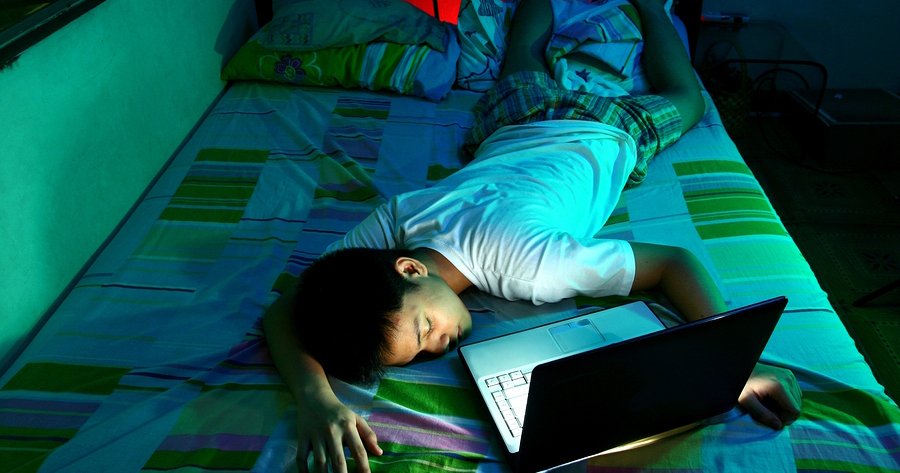We are all probably well aware by now that most teenagers are chronically lacking in sleep. They stay up late during the week and have to wake up extremely early for first period in high school. Then they stay up even later on the weekends, despite often having to rise early to attend sports, religious services, volunteer commitments, or other activities. While earlier research has linked adolescents getting too little sleep with academic and emotional problems, there is new evidence that it may be the cause of this age group packing on extra pounds.
The study, which was conducted at the University of California, Berkeley, found that it appears to be late night bedtimes rather than fewer hours of sleep per night that may be a major factor in unhealthy weight gain in teenagers.1 Asarnow, Lauren D.; et al. “Evidence for a Possible Link Between Bedtime and Change in Body Mass Index.” Sleep. October 2015. Accessed 14 October 2015. http://www.journalsleep.org/ViewAbstract.aspx?pid=30188 The subjects were 3,342 adolescent boys and girls who were tracked between 1994 and 2009. Each participant met with the scientists three times and were interviewed about their habits including bedtime, physical activity, typical diet, and time spent watching television. The visits also included a measurement of their height and weight to determine their body mass index (BMI).
After the data was collected and analyzed, the researchers discovered that those kids with later average bedtimes during the school week were much more likely to have a higher BMI as they got older. And the later the bedtime, the worse the weight gain. For each minute that the bedtime was extended, the subjects faced an increase in BMI of 0.035 kg/m2. That may not sound like much, but it adds up. The scientists calculated that for every extra hour a subject was awake at night, they had an average increase of 2.1 points in their BMI. What’s more, the findings remained constant when the investigators controlled for potentially influential factors such as socioeconomic level, gender, and race.
There were a few surprising factors that were not found to have an influence on BMI. The total duration of sleep, the amount of time spent watching television, and the frequency of exercise were all determined to have little bearing on BMI in the 15-year time period, which is contradictory to several other studies that have shown these links. In particular, the teens who get the most screen time are often sedentary and were shown in a 2013 study at King Abdulaziz Medical City in Riyadh, Saudi Arabia to be at higher risk for obesity.2 Al-Ghamdi, Sameer H. “The association between watching television and obesity in children of school-age in Saudi Arabia.” Journal of Family and Community Medicine. May-August 2013. Accessed 15 October 2015. http://www.ncbi.nlm.nih.gov/pmc/articles/PMC3748652 And common sense along with numerous studies have shown that teens who work out regularly tend to be more physically fit and have BMIs in the normal range than their counterparts who don’t exercise.
But these anomalies aside, we can focus on the fact that–whether it is the bedtime or the overall lack of sleep quantity that is the problem–adolescents in general go to bed too late for their well-being. Yes, a 2014 study at Brown University in Providence, Rhode Island confirmed that at this age, most kids are night owls and so they are doing what comes naturally by going to sleep late many nights.3 Crowley, Stephanie J.; et al. “A Longitudinal Assessment of Sleep Timing, Circadian Phase, and Phase Angle of Entrainment across Human Adolescence.” PLoS One. 7 November 2014. Accessed 15 October 2015. http://journals.plos.org/plosone/article?id=10.1371/journal.pone.0112199 However, it will catch up with them–if not in poor grades because they can’t focus properly in classes, then likely in additional pounds down the road that may not be so easy to take off. And a difference of two points in a BMI can be enough to push a person from the normal weight range into becoming overweight or from being overweight into obesity.
So the point worth taking away from the results of this research is to try to get your teenagers to go to sleep as early as you can. You may have to play the bad guy for a while and enforce a no TV, no phone, no computer policy in their rooms after a certain hour. Even if you can only get them to bed a half an hour earlier than usual it should help the situation. They are not going to like it but try to stand your ground. After all, it does come down to a matter of health.
References
| ↑1 | Asarnow, Lauren D.; et al. “Evidence for a Possible Link Between Bedtime and Change in Body Mass Index.” Sleep. October 2015. Accessed 14 October 2015. http://www.journalsleep.org/ViewAbstract.aspx?pid=30188 |
|---|---|
| ↑2 | Al-Ghamdi, Sameer H. “The association between watching television and obesity in children of school-age in Saudi Arabia.” Journal of Family and Community Medicine. May-August 2013. Accessed 15 October 2015. http://www.ncbi.nlm.nih.gov/pmc/articles/PMC3748652 |
| ↑3 | Crowley, Stephanie J.; et al. “A Longitudinal Assessment of Sleep Timing, Circadian Phase, and Phase Angle of Entrainment across Human Adolescence.” PLoS One. 7 November 2014. Accessed 15 October 2015. http://journals.plos.org/plosone/article?id=10.1371/journal.pone.0112199 |











